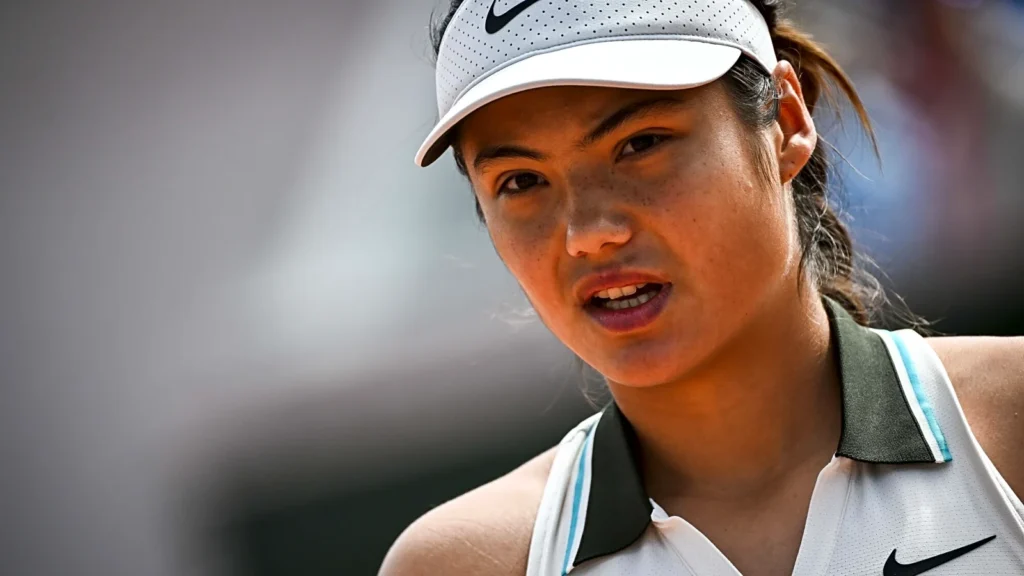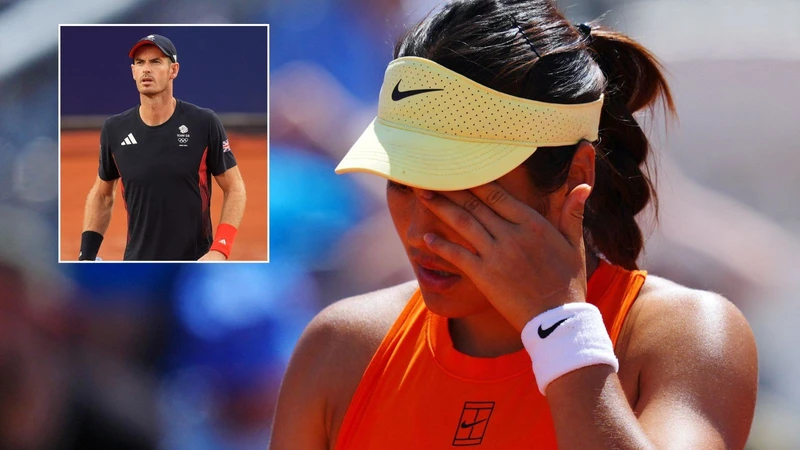When you think of British tennis royalty, Andy Murray and Emma Raducanu are two names etched into the collective memory. One is a three-time Grand Slam champion and former World No. 1 who fought tooth and nail for every inch of respect on the court. The other, a teenage dream turned reality, stunned the world by winning the US Open as a qualifier—an unprecedented rise to fame.
But recently, Emma Raducanu made a rare emotional admission that’s sparked headlines and stirred a wave of sympathy:
“I still feel bad… I don’t even know if he’s forgiven me,” she said, referring to an incident involving Andy Murray that still lingers in her conscience.
And just like that, tennis fans across the world began asking: What happened between Emma Raducanu and Andy Murray—and why is she still haunted by it?
Let’s unpack the heart of the story—and what it tells us about pressure, admiration, and vulnerability in the world of professional tennis.
🎾 The Incident That Sparked It All
The moment in question goes back to a mixed doubles pairing that never happened at Wimbledon. In 2021, Raducanu was the talk of the town after her incredible run in the singles draw, capturing the nation’s attention with her poised performances and maturity beyond her years.
Andy Murray, meanwhile, was continuing his post-surgery comeback, eager to still contribute to British tennis despite a metal hip and a history of grueling battles.
Rumors swirled that Murray and Raducanu might team up for mixed doubles at Wimbledon. It would have been a dream pairing: the grizzled warrior and the rising star. A moment for British tennis history.
But Emma pulled out.
She never confirmed a specific reason then—only citing scheduling and focus on her singles performance. Understandable, considering she was navigating fame, expectation, and physical demands at an alarming speed.
However, now, years later, Raducanu has come clean emotionally:
“I didn’t really know how to manage everything, and I feel like I let him down… It still weighs on me.”
💔 Why It Still Hurts
On the surface, this may seem like a minor issue. A scheduling decision. A miscommunication. Nothing dramatic.
But when it comes to Emma Raducanu, everything carries extra weight.

Since her rapid rise in 2021, she has been under an unforgiving microscope—from her coaching carousel to injuries, media scrutiny, and a wildly fluctuating form. Every move is analyzed, every loss dissected.
Admitting guilt about disappointing Andy Murray, a living legend and national hero, adds a layer of humility and humanity that many fans didn’t expect.
It also reveals how much Emma values the legacy of those who came before her.
“Andy’s done so much for tennis in this country… just being considered to play alongside him was an honor.”
Her words aren’t just about the match that never happened—they reflect the burden of expectation young athletes carry in the spotlight.
🧠 Mental Weight: More Than Just a Missed Match
Emma’s quote—“I still feel bad”—is a haunting confession. It’s the kind of sentiment we rarely hear from elite athletes. Vulnerability in public can be risky. But Raducanu’s transparency reminds us that:
- Tennis is lonely.
- Reputation matters.
- And sometimes, the hardest opponent is yourself.
In a world where athletes are often expected to be bulletproof, Raducanu’s guilt about letting down Murray resonates because it’s so human. It shows that she’s not just a player, but a person trying to live up to her own high standards and those of a country that saw her as the next great hope.
👑 The Murray Legacy: A Standard to Live Up To
To understand the full weight of Emma’s words, you have to understand Andy Murray’s place in British tennis.
He’s not just a champion—he’s a symbol of grit, class, and resilience. The man who ended Britain’s 77-year wait for a Wimbledon men’s champion. The player who fought for equal pay in tennis and was one of the first men to consistently support women in the sport, vocally and visibly.
So when Emma Raducanu speaks about feeling like she let him down, it’s not just about missing a match—it’s about missing a moment with a mentor, a national icon, a tennis brother in arms.
🤝 Forgiveness: Has Andy Murray Moved On?
The big question that lingers is: Has Andy Murray forgiven her?
Knowing Murray’s dry wit and deep understanding of the sport, it’s very likely he harbors no ill will toward Emma. In fact, in public comments over the years, he’s shown support for her despite her ups and downs.
But Emma’s lingering guilt suggests she hasn’t fully forgiven herself.
That’s what makes this story compelling—not because of drama, but because of emotional resonance. Raducanu, even with a US Open title, global fame, and millions of fans, is still haunted by one moment she believes she mishandled.
🛠️ Redemption and Reconnection?
There’s a beautiful story still waiting to unfold. Imagine this:
- Emma Raducanu fully healthy, back in form.
- Andy Murray in one of his final Wimbledon appearances.
- The two finally teaming up on Centre Court.
- A standing ovation from the British crowd.
- Redemption, reconnection, and resolution.
Even if it never happens, the sentiment behind Emma’s words is enough to ignite that hope. And if Andy and Emma do find a way to link up before his retirement, it could be one of the most emotionally charged moments in Wimbledon history.
🗣️ What Fans Are Saying
Social media lit up after Emma’s comments.
Some fans were heartbroken:
“Emma’s so hard on herself. She was 18 and under immense pressure. Andy would understand.”
Others speculated:
“Maybe she wants to team up this year? Wimbledon could give us a magical moment if they do.”
And many just admired her honesty:
“Rare to see an athlete open up like that. Shows her class.”
The online chatter shows that this moment has struck a nerve. It’s not just about tennis—it’s about second chances, respect, and the invisible ties that bind generations of athletes.

🏁 Final Thoughts: Emma’s Guilt is Her Grace
In the grand scheme of things, a missed doubles pairing doesn’t alter legacies. But the fact that Emma Raducanu still carries that moment shows how much she cares—about her peers, her sport, and her place in the lineage of British tennis.
It’s easy to focus on trophies and rankings. But moments like this remind us that the best athletes are the ones who carry not just a racquet—but a conscience.
Emma Raducanu is still writing her story. And maybe, just maybe, this moment of vulnerability is the prelude to a deeper comeback—not just in form, but in faith in herself.
And who knows? The next time Wimbledon rolls around, perhaps Centre Court will give us the moment we all missed—and the redemption Raducanu quietly craves.


